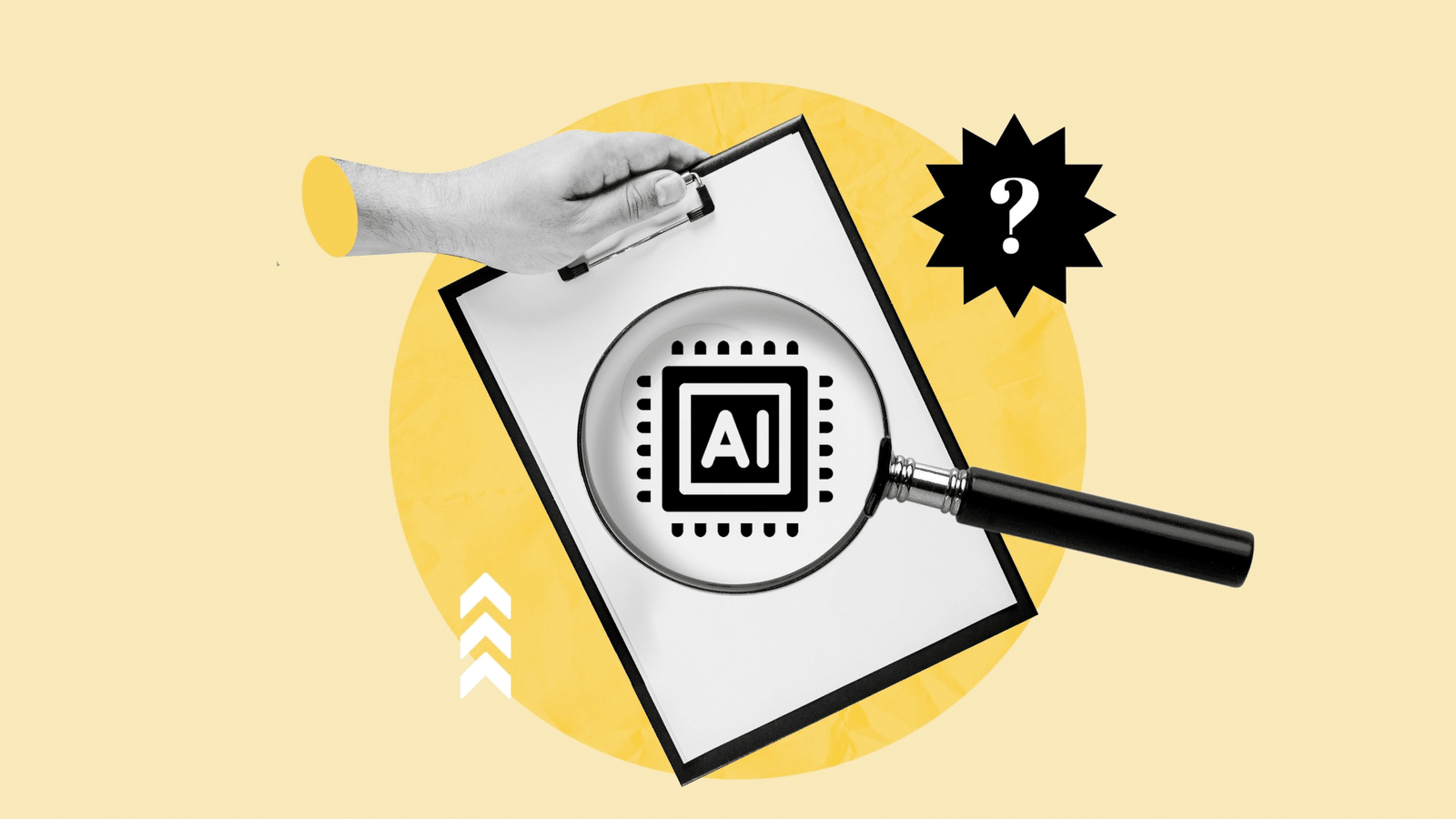Gartner predicted in February that, by 2026, search engine volume will drop by 25%. The total market share lost by search will be transferred to AI chatbots and other virtual agents:
- “Generative AI (GenAI) solutions are becoming substitute answer engines, replacing user queries that previously may have been executed in traditional search engines,” said Alan Antin, Vice President Analyst at Gartner.
- “This will force companies to rethink their marketing channels strategy as GenAI becomes more embedded across all aspects of the enterprise.”
This means SEO is, yet again, changing.
An estimated 8.5 billion searches are conducted on Google each day. The key is to keep winning with Google while optimizing for AI-powered search. Here’s how.
4 ways to win in AI-powered search
Publishers don’t need to do anything new to benefit from AI Overviews, according to Google Search Central. The same may be true for chatbots and LLMs.
This means continuing what you’re doing to rank well on the SERPs will help you rank for AI-powered search.
Rich Sanger and Authoritas recently conducted a study on AI Overviews, revealing a significant overlap between traditional search rankings and rankings in AI-driven search results.
Their findings suggest that as AIOs increasingly influence search outcomes, it’s essential to focus on key strategies to maintain and improve visibility.
Here’s what you should prioritize as AIOs gain greater control over search rankings.
1. Continue ranking well on Google’s SERPs
Sanger’s study found that a webpage ranked in Position 1 on the SERPs has a 53% chance of being included in Google’s AI Overviews, while a page in Position 10 has only a 36.9% chance.
The better you rank in Google, the higher your chances of AI selecting you as an answer to user queries.
That said, let’s review the factors that help you rank higher on the SERPs.
High-quality, authoritative content
As Google has always said, aim to create “helpful, reliable, people-first content.” Publish valuable content to benefit readers, not simply to rank highly on the SERPs.
Here’s a list of questions from Google Search Central to help you weigh your content quality:
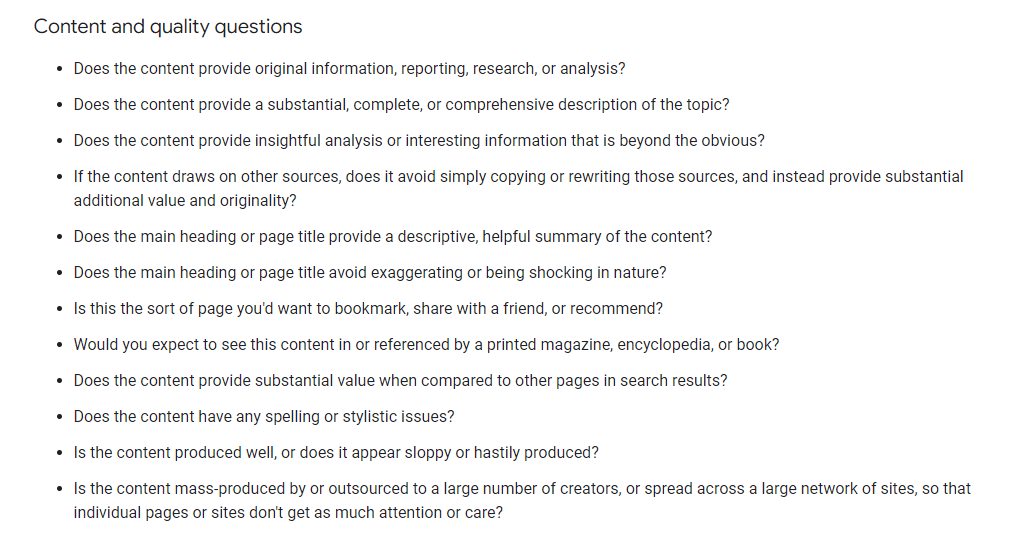
When creating content, keep readers in mind. Add rich media like images, infographics and video to keep them on the page longer.
Great content also leads to more backlinks. The more high-quality backlinks you have, the better your chances of ranking.
Technical SEO and schema markup
Technical SEO is a must if you want search engines to easily crawl and understand your site. Make sure you pay attention to:
- Schema markup. Structured data like FAQ schema and HowTo schema.
- Page speed and mobile optimization. Google’s Core Web Vitals metrics focus on aspects like load time and interactivity. Ensure your content is optimized for fast loading and mobile responsiveness.
- Crawlability. Your website should be easily crawlable by search engines. Use an updated sitemap and maintain a clean site architecture so bots can easily index your content.
Entity optimization
When you optimize for entities, you give your site a better chance of ranking in the SERPs.
“Things, not strings,” a famous 12-year-old saying, highlights that Google’s machine learning can understand the meaning behind a keyword.
Focus on proper nouns associated with the keywords you want to rank for.
For instance, if you’re writing a post titled “Top 10 Ways to Grow Your Business,” you can add the names of well-known businesses and entrepreneurs like “Apple” and “Steve Jobs.”
Get the newsletter search marketers rely on.
The best way to be featured in Google’s AI-powered search is to continue ranking well in traditional search, according to Google.
That said, let’s move onto three other things you can do to increase your chances of being featured.
2. Target informational keywords
Informational keywords win over transactional keywords when it comes to being featured by AI Overviews, according to studies by seoClarity and Flow.
For example, a blog you wrote targeting the keyword “how to grow white strawberries” has a bigger chance of being featured in AI-powered search than a blog targeting the keyword “white strawberries for sale.”
Top-of-funnel keywords are more likely to appear in AI-powered searches than other keywords.
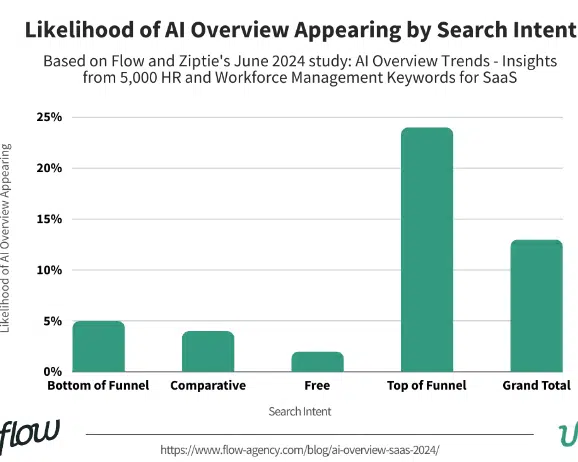
3. Go for relevant queries and long-tail keywords
Google highlights that AI-organized results exist to remove the “legwork” from searching.
To be featured in them, target detailed queries and long-tailed keywords. AI results exist to break down these queries, so going after them gives you a better chance of getting featured.
For example, target keywords like “how to choose black shoes for men” instead of “black shoes” or even “shoes.”
Here’s an example for the keyword “how to rank well on Google.”
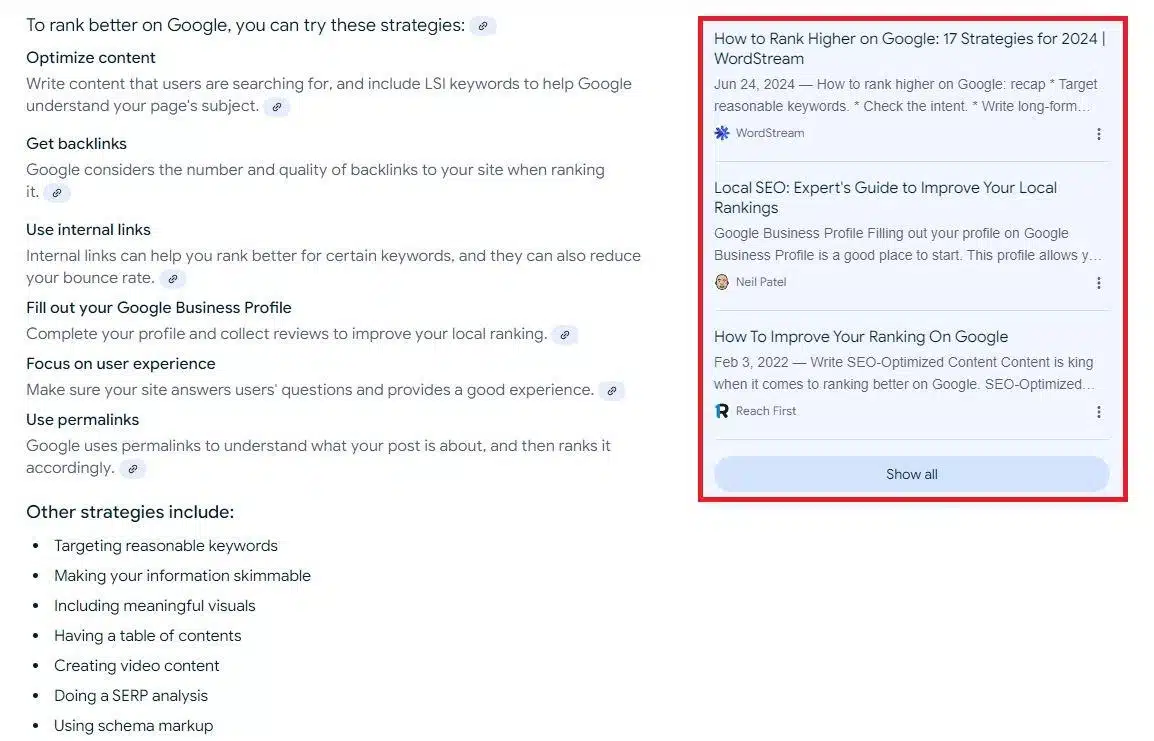
Open each of these blogs, and you’ll see that they target the detailed, long-tail keyword “how to rank well on Google.”
4. Match search intent
AI-generated results exist to give users an easier time. To get featured, one thing you can do is create content and target keywords that match their search intent.
For example, here are the results for “list of superfoods.”
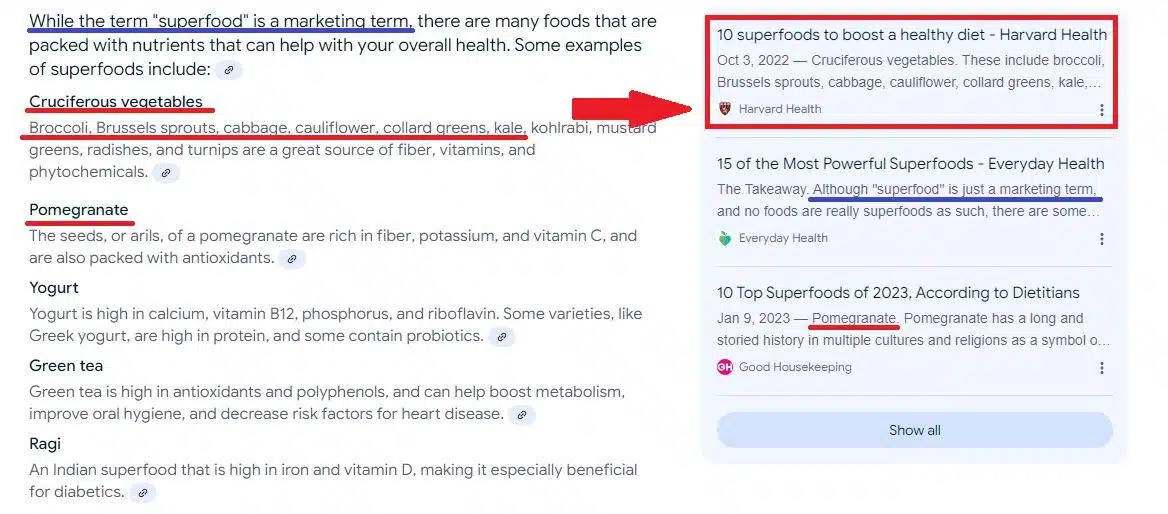
As you can see, Google AI Overviews took information from blogs that matched the search intent for the keyword, rewrote it and included it in the AI-generated results.
But do you want to be featured in AI-powered search?
Since the release of Google AI Overviews and other AI-powered search tools, SEOs have been asking, “Do I really want to be featured in AI results?”
Here are their concerns:
- AI-powered results already answer questions, making it unnecessary for users to click on their link.
- AI borrows and even rewrites content to be featured in their results.
AI-powered search could cause a drop in traffic ranging from 20% to 50%. This is especially true for content written around informational queries that can be answered quickly.
However, this doesn’t mean you shouldn’t try to get featured in AI results.
It’s clear that Google is moving toward these results with no likelihood of turning back, so getting your website in the top featured list of links can help instead of hurt you.
AI search engine visibility: It’s not really that different from regular search
AI Overviews, chatbots, LLMs. They’re taking over the world of search. They’re providing users with even more ease and convenience.
But there’s not much for you to worry about. For now, it seems the main thing you can do to appear in AI-powered search is to do what you’ve always been doing to rank well on the SERPs.
Plus, Google search is still number one, with 8.5 billion searches per day. Compare that with ChatGPT’s 14 million searches per day, and you can rest assured optimizing for traditional search is still the best way to go.
Contributing authors are invited to create content for Search Engine Land and are chosen for their expertise and contribution to the search community. Our contributors work under the oversight of the editorial staff and contributions are checked for quality and relevance to our readers. The opinions they express are their own.
Share this content:
